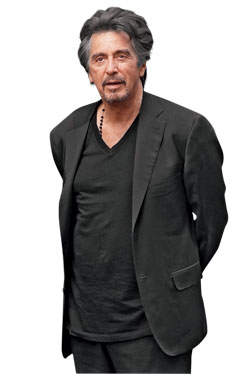
In his long, often-glorious career as perhaps the best post-Brando American screen actor, Al Pacino has said several memorable things. As Michael Corleone in The Godfather: Part II, he explained that when one finds oneself in a position of ultimate power, it is good to “keep your friends close but your enemies closer.” Playing a most peculiar bank robber in Dog Day Afternoon, he shouted, “Attica! Attica!” But now, about to portray Shylock in The Merchant of Venice, a character with lines possibly even better known than Tony Montana’s “Say hello to my little friend,” the great thespian sits under a tree in Central Park, speechless.
The question was whether it is an actor’s responsibility to consider the external vicissitudes of a role, i.e., the long debate over whether in creating his famous Venetian moneylender, Shakespeare, deliberately or not, forged an icon of the evil Jew that has served for centuries as an attack model for anti-Semites. Pacino, who first played Shylock in a 2004 movie version of the play and is now reprising the role at the Public Theater’s Shakespeare in the Park, approaches the concept in phases. First he appears to reject the notion of Shylock’s “baggage,” questioning if the character is really all that controversial. Then, somewhat defensively, he says, “You have to understand that times change—what was true for many people 400 years ago is not true today.”
Then the actor engages in a more visceral grapple with the idea, digging deeper, searching for a better answer. It’s an impressive process to watch, since for all of Michael Corleone’s icy precision (or Scarface’s careening hip-hop dream life), Pacino has always appeared to be a little slow on the uptake. With him, there is a sense of measuring, figuring things out; few actors have ever thought so convincingly onscreen. The initial inarticulateness, followed by a lightning explosion of what he really thinks, how he really feels, has always been the Pacino trademark, his way of truth.
The answer soon comes, arriving as a left hook launched from a somehow unexpected angle. One moment the actor is sitting there, diffuse, almost absent, a wild-haired, stoop-shouldered man in a very expensive yet hopelessly rumpled black linen sport coat, a red kerchief knotted around his neck. Then he becomes, indisputably, Al Pacino.
“Look,” he says, hand suddenly clamped on my wrist for emphasis. “This is a man whose daughter has been taken from him. Kidnapped! This is the only family he has. He has been abused, spit on. He will have his chance to get his revenge, and in that moment he will overact. This is the character. This is the only character I can play.”
It wasn’t that Pacino was ignorant of the issues Shylock brings to the stage. (He’d later send e-mails to make sure the point was not missed.) Born in East Harlem, raised for a time in the South Bronx, Pacino had shit jobs all over town—it wasn’t like he’s never heard the term shylock. He knows, too, that Harold Bloom said it would have probably been a better thing for the Jews if Shakespeare had never written this particular play. Bloom was “entitled to his opinion,” Pacino says. But that didn’t change the magnificence of the speeches, “some of the greatest ever written.” The character could be interpreted forever; for Pacino, “Shylock is an outcry against prejudice,” he says. Above all, it’s a part to be played, for a performer to bring to life.
Somehow it is a shock to know Al Pacino is now 70 years old. While not overly thrilled about this, he takes comfort in doing Shakespeare. Sitting beside the Delacorte, he says, “You know, I’ve never performed here, but it is still a homecoming because this is where I began. The movies came later. Movies are important, but in your career, especially one as long as mine, mistakes can be made, you pick the wrong role, there’s the money thing. But where I started, with Ibsen, Strindberg, Shakespeare—that doesn’t change. They recently did a Strindberg play, Creditors, at the Brooklyn Academy of Music. I was in that when I was 21 years old. Shakespeare is the best for me because there’s a thought beyond what you can even comprehend, beyond consciousness. You can just keep coming back to it—there is always a deeper place to go.”
Then Pacino recalls one of his favorite moments of his acting career. “I was in American Buffalo, the David Mamet play. I did it a lot, four years altogether. Now, I’ve heard that I can be a frenetic actor, and that’s what I was doing in the beginning in American Buffalo—bouncing up and down. Then one night, I realize that I have been standing in the same place for fifteen minutes. Fifteen minutes is a very long time in a play. But I’m doing the part, doing it well. The audience was very happy, the director was happy, I was happy. I think that was the night I finally got the character, felt completely in it. Maybe it is like that in life. One day you stop running, and there you are.”
Have good intel? Send tips to intel@nymag.com.